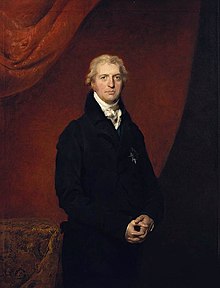Events

- 2 January – The Institution of Civil Engineers is founded at a meeting in London. [1]
- 6 January – Treaty of Mundosir annexes Indore and the Rajput states to the British East India Company. [2]
- 3 February – Jeremiah Chubb is granted a patent for the Chubb detector lock. [3] [4]
- 4 February – The Honours of Scotland are put on display in Edinburgh Castle after being found in store there; [5] Walter Scott has been one of the prime movers in the discovery.
- 11 February – Marie André Cantillon attempts to assassinate the Duke of Wellington in Paris.
- 16 April – The Court of King's Bench (England) decides the case of Ashford v Thornton , upholding the right of the defendant, on a private appeal from an acquittal for murder, to trial by battle. [6] [7] Four days later, the plaintiff declines to fight.
- 18 April – John Ross sets sail from London on the Isabella on an Admiralty expedition to search for the Northwest Passage. [8]
- 7 May – The king's son Prince Adolphus, Duke of Cambridge, marries Princess Augusta of Hesse-Kassel in Kassel, and again on 1 June at Buckingham Palace, one of three royal marriages this year with a view to ensuring the succession to the crown, as the king now has no surviving legitimate grandchild.
- 11 May
- The Old Vic is founded as the Royal Coburg Theatre in South London by James King, Daniel Dunn and John T. Serres.
- The Westmorland Gazette is first published at Kendal in the Lake District of England; in July, Thomas De Quincey will begin a 16-month term as editor.
- 29 May – The king's son Prince Edward, Duke of Kent and Strathearn, marries Princess Victoria of Saxe-Coburg-Saalfeld at Schloss Ehrenburg, Coburg, and again on 11 July at Kew Palace, the only one of this year's royal marriages which will ensure the succession to the crown, as the Duke will be the father of Queen Victoria. [9]
- 30 May – Church Building Act makes available £1 million for the construction of new Anglican "Commissioners' churches" to serve the expanding urban population.
- 3 June – Third Anglo-Maratha War: Baji Rao II, ruler of the Maratha Empire, surrenders to the British East India Company. [10]
- 17 June – The 1818 general election begins after Prime Minister Lord Liverpool had asked the Regent to dissolve Parliament on 10 June. It is the first election to be held since 1812 and the first since the end of the Napoleonic Wars.
- 11 July – The king's son Prince William, Duke of Clarence, marries Adelaide of Saxe-Meiningen at Kew Palace. [11] Although William will succeed as king, he leaves no surviving issue from this marriage.
- 18 July – The general election ends in victory for Liverpool's Tory government over the Whig opposition, though with some seats lost.
- 23 July – The Crown agrees sale of its rights in the royal forest of Exmoor. Thomas Dyke Acland secures a herd of Exmoor ponies, the nucleus of the modern breed.
- 25 September – Dr James Blundell carries out the first blood transfusion using human blood, in London. [12]
- 1 October – The Congress of Aix-la-Chapelle commences with Britain represented by Lord Castlereagh, the Duke of Wellington and Lord Stewart.
- 20 October – The Treaty of 1818 between the United States and the United Kingdom establishes the northern boundary of the former as the forty-ninth parallel from the Lake of the Woods to the Rocky Mountains, also creating the Northwest Angle.
- 15 November − At the Congress of Aix-la-Chapelle Britain becomes a member of the Quintuple Alliance while also signing a secret protocol to continue the Quadruple Alliance (1815).
- 30 November – The Allied Occupation of France ends with the last British troops under the command of the Duke of Wellington being withdrawn.
- Undated – Besses o' th' Barn brass band is formed at Whitefield in the Manchester cotton district. [13]
